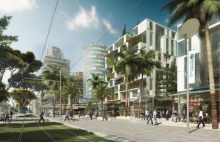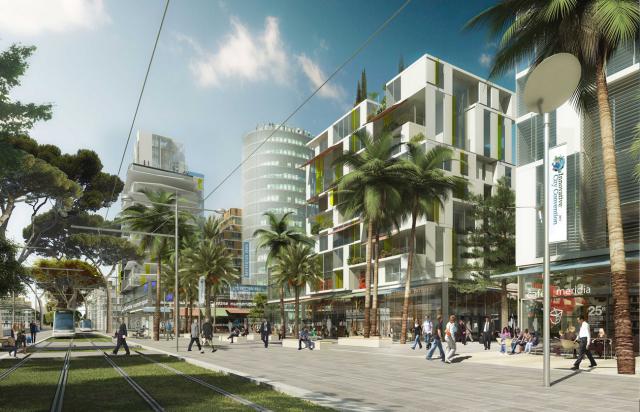
Metropolitan council gives green light to creation and operation of a heating and cooling network to serve Nice Méridia. It will be the first geothermal network of the Nice Côte d’Azur Metropolis, distributing more than 30 GWh to heat and cooling to the entire neighborhood with 80% renewables. Another first: the creation in parallel of a multi-energy smart grid offer, accompanying the energy optimisation of the eco-district. The developments part of Nice Côte d’Azur goal to reach a 32% share of renewables in its energy mix by 2030.
Christian Estrosi, Mayor of Nice, President of the Nice Côte d’Azur Metropolis and Deputy President of the Provence-Alpes-Côte-d’Azur region:
“With this first-ever geothermal network, we sign the end of individual or semi-collective gas and electric heating using electric heat pumps that disfigure the facades and roofs of buildings. We are entering the era of technical and economic innovation serving the environment and energy solidarity. We are entering a sustainable era. Nice Méridia, as we wanted it, that is to say an eco-district, must be exemplary for the living environment that it offers to its inhabitants, but also for taking into account environmental evolutions since its conception. Focused on environmental technologies, Nice Méridia will be one of the main areas of development of the Alpes-Maritimes and an example of what the cities of tomorrow will be: perfectly served by public transportation, most notably the tramway, where housing, shops, recreation areas and parks will be near. In a harmonious, pleasant to live ecosystem.”
Nice Méridia is registered in the program of the operation of national interest Plaine du Var “Eco Valley”, and it will eventually be composed of 537,000 square meters of surface, including 187,000 square meters of housing, which will be powered by the heating and cooling network thanks to 90 innovative substations.
The Nice Côte d’Azur Metropolis approved on March 13, 2017 the 25-year public service concession principle. Following a public call for tenders and a competitive bidding procedure, the IDEX Territoires bid was selected and the award of the contract will be presented for approval by the next metropolitan council. The IDEX Territoires company operates about fifty heating and cooling networks in France and its annual turnover amounts to 860 million euros.
The mission of IDEX Territories will be as follows:
- Produce calories and frigories from the geothermal resource of the aquifer of the Var River through 4 dewatering wells and 8 reinjection wells.
- Provide 82% heat production with renewable energy, 78% for the cold.
- Propose a pricing to ensure competitiveness with a hot and cold average rate of less than 75 € HT / MWh.
- Propose neighborhood energy optimization: generation and storage of production and consumption metering data, management and storage of energy, management of charging facilities for electric vehicles or energy coaching for residents.
Over the duration of the contract, more than 470 GWh in the form of heat and cold will be produced and distributed locally. This production will take place in a 2-level building located on a lot made available by the Metropolis at avenue Simone Veil.
Local investments amount to 18.8 million euros excluding taxes, which will generate very positive local economic benefits. Another advantage is the amount of local public royalties which will be 3.4 million euros over the duration of the concession.
More broadly, this action is also part of a large-scale European project, IRIS (Integrated and Replicable Solutions for Co-Creation in Sustainable Cities).
This project, which integrates 9 European cities, tends to favor the deployment of innovative solutions and to assert the positioning of Nice Côte d’Azur as Smart City. The installation of this first geothermal network within Nice Méridia is part of one of the axes of this project, which is to demonstrate that smart energy management and storage at an urban scale can have a significant impact on reducing peak load and fuel spending, deferring investment in network reinforcement while still meeting carbon targets and reducing the need for a significant increase in reserve generation capacity.

17 Jul 2018

